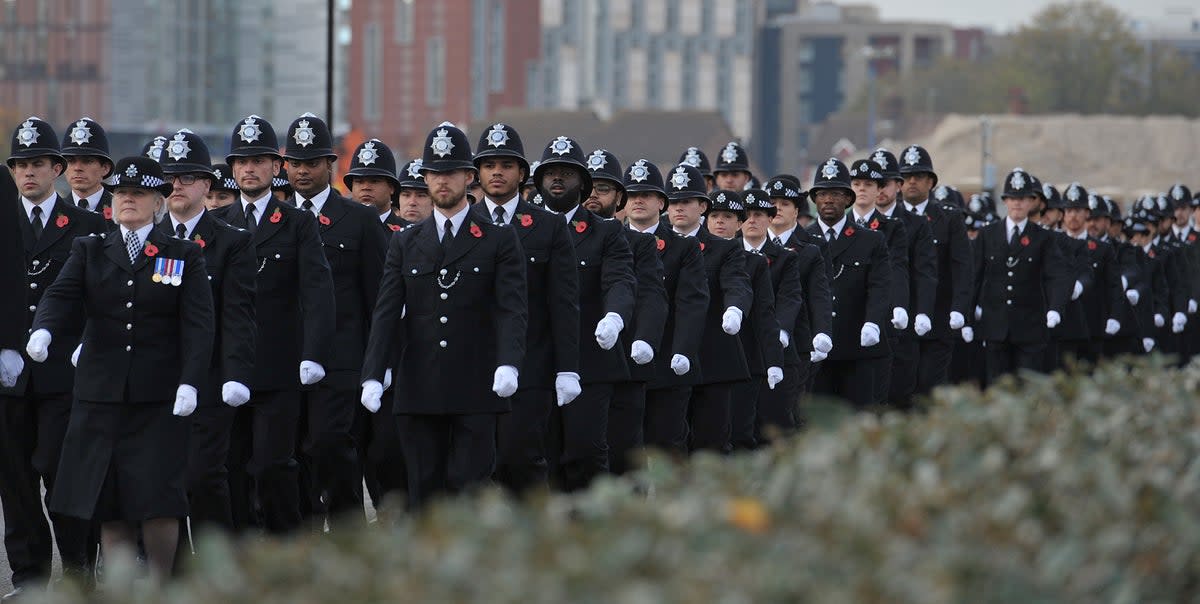One in five police officers plan to quit over pay and ‘lack of respect’ from government, survey shows

One in five police officers plan to quit amid rising anger over pay, working conditions and treatment by the government, a survey suggests.
Polling of almost 37,000 officers in England and Wales showed forces to be at “crisis point and the police service is on its knees”, the Police Federation said.
The findings place Boris Johnson’s pledge to recruit 20,000 extra constables by the end of March in fresh doubt, with voluntary resignations already at a record high.
The exodus means that more empty posts have to be backfilled to achieve the increase, which was promised in 2019.
Steve Hartshorn, the Police Federation’s national chair, said officers were being “punished” because they were legally barred from striking over pay, unlike other public sector workers.
“Record numbers are resigning over inadequate pay and conditions,” he added.
“We are losing some exceptional officers simply because they cannot afford to stay in the service, with an alarming number unable to afford monthly essentials.”
It comes as police-recorded crimes hit a record high but the proportion charged plummeted to new lows, with only 5.6 per cent of offences in the most recent year prosecuted.
A third of all investigations end with no suspect identified and a quarter of cases remain open after a year, while many more end because of “evidential difficulties”.
Yvette Cooper, the shadow home secretary, said: “After 13 years of Conservative mismanagement police morale is low and too many good officers are considering leaving the service.
“That’s making shortages of detectives and the cuts to neighbourhood policing even worse. Losing skilled police officers means losing vital experience in keeping communities safe which is one reason the Tories are so weak on their promise to reverse their own cuts.”
The Police Federation’s annual survey found that 18 per cent of respondents planned to resign as soon as possible or within the next two years, up from 12 per cent in 2021.
The most common reasons were morale, how the police are treated by the government – with 94 per cent of respondents saying that they “do not feel respected by the government” – and pay, which has fallen in real terms amid the worsening cost of living crisis.
One officer responding to the survey said police faced “constant blame from the government”, while others felt they “do not have the backing” of ministers, following public rows over the policing of environmental protests.
A long-serving constable said that despite Mr Johnson’s pledge to recruit 20,000 extra officers, staffing remains “very low”, adding: “The public have been completely hoodwinked over staff numbers.”
The Home Office insists the uplift is on track, with more than 15,000 extra officers recruited by October – but official figures show that the average number of officers recruited every month would have to double to hit the target.
Statistics released under freedom of information laws show that at least 1,800 police officers hired as part of the scheme have already quit, and a Home Office report last year confirmed a record surge in voluntary resignations overall.
Almost nine in 10 respondents to the Police Federation survey did not feel there were enough officers to manage demand, highlighting issues of increased workloads as calls generated by overwhelmed mental health and NHS services fall on policing.
The vast majority of officers said they were not paid fairly for the strain and risk of their jobs, reporting increasing stress, low mood and anxiety.
Mr Hartshorn said the results of our survey “clearly illustrate the anger and disillusionment of police officers across England and Wales”.
“Many have stopped expecting any recognition from the government for their unique responsibilities and the restrictions imposed on their industrial rights which is, quite frankly, dangerous,” he added.
“Being able to protect the public effectively rests on a knife edge … officers will not be able to stretch resources to attend all crimes and, ultimately, will not be able to keep our communities safe from the rise in violent crime.”
Mr Hartshorn appealed for the government to listen to calls for pay increases and changes to the police funding model, and “not ignore the needs of the service because they do not have the right to strike”.
The Home Office insisted that “policing remains an attractive and rewarding career” and said its own survey of new police recruits found high job satisfaction, and showed that 81 per cent intended to remain in the service for the rest of their working lives.
A spokesperson added: “We recognise the impact of the cost of living, which is why we accepted in full the Police Remuneration Review Body’s recommendation to award a consolidated increase of £1,900 to all ranks of police officers.
“The government remains on track to deliver its pledge to recruit 20,000 police officers by March 2023.”

 Yahoo News
Yahoo News 
